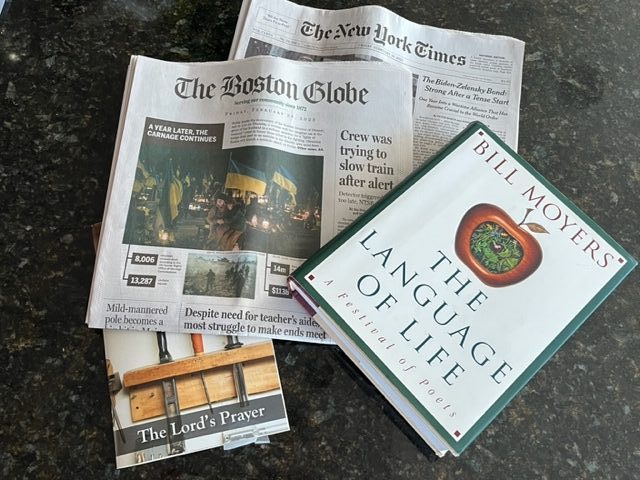A Lenten Practice that Will Change Your Life
The great French writer Andre Gide once wrote, “Tyranny is the absence of complexity.”
As a writer, the story of the tower of Babel has always had a magnetic hold on me.
I’m not alone. The dream of a society in which ideas can be expressed and poetry understood without the messiness of translation has fascinated humans for generations.
Last week, Babel and its tower appeared in the lectionary from Genesis. The timing couldn’t have been more serendipitous.
“Let’s build a tower! Let’s create an impenetrable ‘mind field,’” the people said.
The significance of the tower was clear. It would keep those who agreed with one another in control and the others out.
Under the illusion that a powerful group can effectively create (and maintain) a unanimous voice, the people of Shinar crafted a narcissistic echo chamber. They could promulgate whatever version of reality they desired, with no fear of objection or challenge. Without, if need be, even facts.
Sound familiar?
The recent story of Fox News and the patent lies of its news anchors in promulgating stolen election stories is just the latest example. Millions are being spent on erecting towers of Babel wherever money and power can assert itself every day.
Many years ago, at the dawn of the internet – we, too, wanted to believe that a world-wide web would unite the entire global community in a single language to solve common problems. It has proven just the opposite, of course. We open our phones each morning to fragmentation caused not by honesty and real diversity of views, but by entrepreneurs who profit from sowing conflict.
God, in the Genesis story, had a different idea.
“If now, while they are one people, all speaking the same language, they have started to do this, nothing will later stop them from doing whatever they presume to do.” (Gen. 11:1-9)
Smart insight, this God.
The only hope for humankind – then and now – was to revert to a messy abundance and diversity — of languages, viewpoints, truths.
“Let us then go down and there confuse their language, so that one will not understand what another says.”
Given the degree of polarization we face today, it might seem ironic to suggest that difference and even conflict is the ONLY way we shift out of our own frames of reference, to stretch and grow towards the worldviews of others. But just because it has become so much harder than it once was, doesn’t make it less true. It is how we grow.
One voice that speaks eloquently to this truth is the Nigerian novelist, Chimamanda Adichie. In 2009, she delivered a TED talk she titled, “The Danger of the Single Story,” based on her experience of arriving in the U.S. for college and encountering painful misassumptions about her capacities, skills and intelligence.
https://www.ted.com/talks/chimamanda_ngozi_adichie_the_danger_of_a_single_story
The difference between propaganda and open political discourse is that propaganda argues relentlessly to reinforce a certain “truth.” Discourse asks questions.
Much as I love poetry, and discover deeper truths in my walks and reflections, on a morning like this I think that the most important job God gave writers to do is to be sledgehammers.
Telling the truth, honestly and forthrightly, even when it is hard to do, even when it goes against the grain of our own group, or the dominant views of our various tribes, is one of the high calls of our work as writers.
The reason why we are so restless, rarely stay in one place or aim for a predictable consistency of “brand,” is that if we settle, we grow stale, self-involved, repetitive. We stop seeing the towers being erected on the edges of our worlds.
Words can break down walls. Words can attest to the complexity, variety, diversity – the grace and the suffering places in creation. They have a power that bricks never will because they speak into the center of our hearts and minds.
There are so many examples of writers whose work has changed the way we understand ourselves and the dynamics of injustice. James Baldwin comes to mind today. Writing about the racism he experienced as a young man, particularly in his remarkable Notes of a Native Son, he later said,
You write in order to change the world, knowing perfectly well that you probably can’t, but also knowing that literature is indispensable to the world… The world changes according to the way people see it, and if you alter, even by a millimeter, the way… people look at reality, then you can change it.
There are many beautiful and imaginative and inspiring and playful purposes to which we can put our words. But in these times, it is our moral obligation to remain vigilant witnesses to what is said, what is true, and what is just another pile of heavy and dangerous bricks.
A Lenten Practice:
The words we use, the words we consume, the words we believe, are the most powerful tools we have as human beings.
Pay attention to what you absorb and repeat, and you care for yourself at the most fundamental level. Your mind and your soul are precious but fragile vessels of light and darkness. The same is true of your friends, partners, and children. Tend to honesty and value and integrity in the ways in which you take in and offer words, and you will be tending the light, within and among you.





Joan Hadly
March 23, 2023at2:41 pmThank you Kathleen. Your words about our minds and souls being precious but fragile vessels of both light and darkness described my recent struggles. Words matter. Grateful for you.
Kathleen Hirsch
March 23, 2023at3:36 pmDear Joan, I’m so glad that you found comfort and strength here. My prayers are with you.
Susan Richmond
March 2, 2023at10:25 amKathleen, that a perfect Lenten practice. Thank you for your words!!
Kathleen Hirsch
March 2, 2023at4:37 pmThanks Susan, a challenge, but a good one!
Susan Morrison
March 2, 2023at9:47 amBravo, Kathleen! Thanks for writing and telling the truth!
Kathleen Hirsch
March 2, 2023at9:50 amThanks so much for your support, Susan! You walk this talk every day and I admire you for it!
Gail O'Donnell
March 2, 2023at9:42 amThank you for the suggestion of
Guarding our words as a Lenten practice, Kathleen,
Kathleen Hirsch
March 2, 2023at9:44 amThank you, Gail! It’s so important – in prayer, in conversation, even in our silence!
Elizabeth A Rhymer
March 2, 2023at9:27 amThought provoking
Thank you for the link to the TED talk. I must admit I now see clearly that I have many single stories about the world and its people. My perspective is shifting thanks to you.
Kathleen Hirsch
March 2, 2023at9:36 amIt’s quite a talk, isn’t it? Everyone should see it. Thanks for writing!